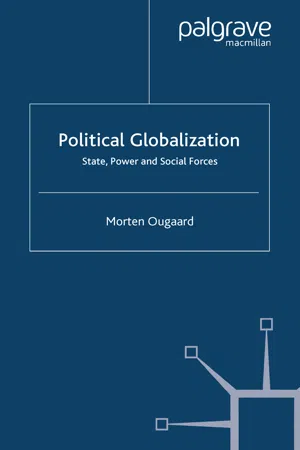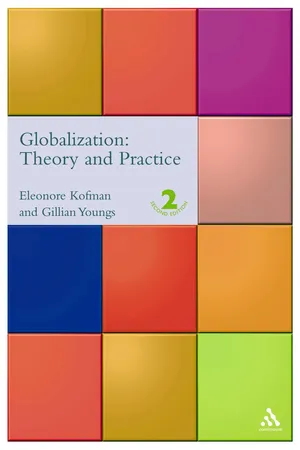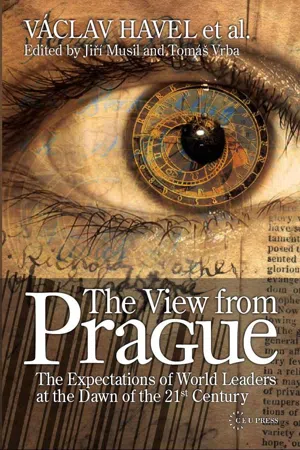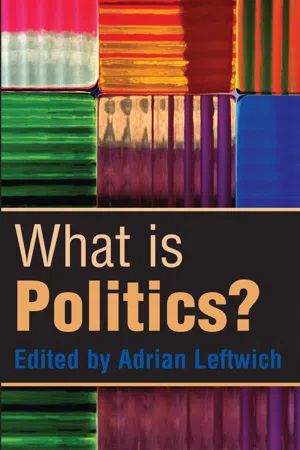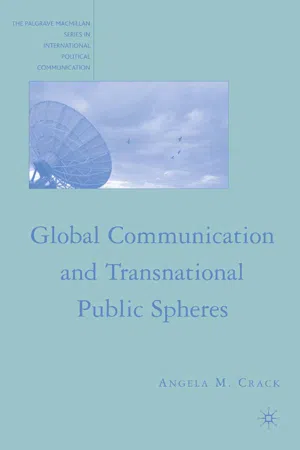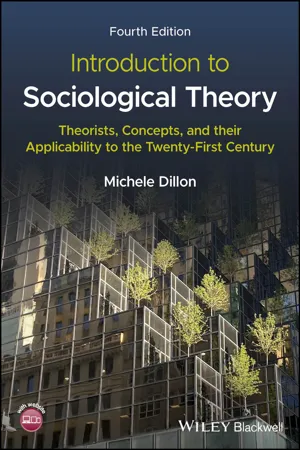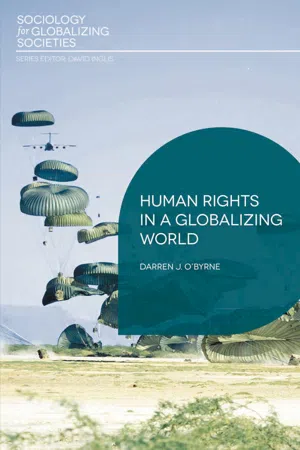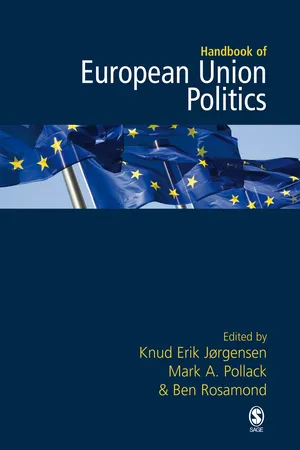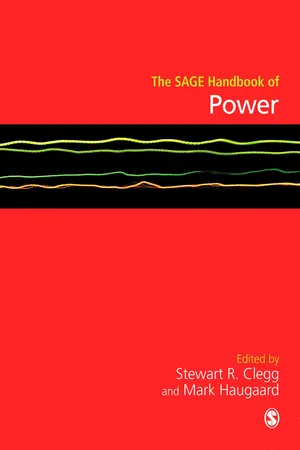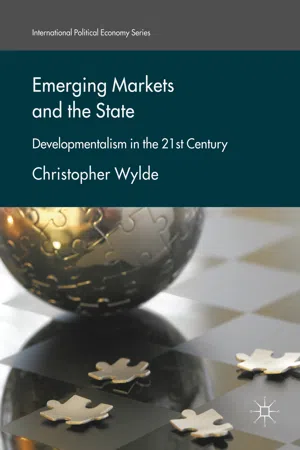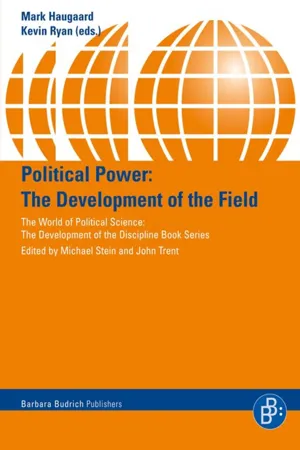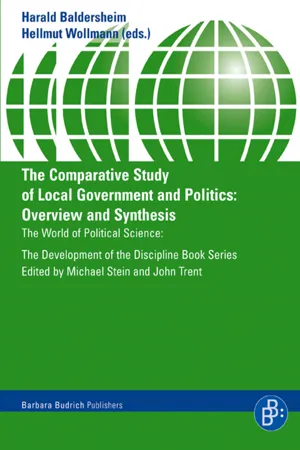Politics & International Relations
Process of Globalisation
The process of globalization refers to the increasing interconnectedness and interdependence of countries and people around the world, driven by advancements in technology, communication, and trade. It involves the flow of goods, services, capital, and ideas across borders, leading to greater economic integration and cultural exchange. Globalization has significant implications for politics, economics, and social dynamics on a global scale.
Written by Perlego with AI-assistance
Related key terms
1 of 5
12 Key excerpts on "Process of Globalisation"
- eBook - PDF
Political Globalization
State, Power and Social Forces
- Morten Ougaard(Author)
- 2003(Publication Date)
- Palgrave Macmillan(Publisher)
1 Introduction 1 Introduction: globalization and politics The title of this book ‘Political Globalization’ was chosen to signal that there are important political aspects to the process of globalization. In very general terms these aspects involve transformations in the relations between political processes and territorial states. There is a double pro- cess in which nation-states and the conditions under which national policies are formed and conducted are changed, while at the same time multiple international and transnational political relations develop and intensify, so that nation states increasingly must be seen as components in a larger and more complex international political configuration. Globalization is not only a matter of nation-states facing challenges and opportunities from an increasingly integrated world economy, but also and significantly a question of the political institutions of territori- ally defined national societies becoming integral parts of an increasingly interconnected international and global political system. The purpose of the book is to contribute to the theoretical and empir- ical analysis of this phenomenon. The intention is not to cover all aspects of this broadly defined agenda which in principle could include practically all issues and problems being studied in the fields of inter- national politics and international relations. The intention is to focus on selected aspects that are particularly relevant from the theoretical perspective applied. At the centre of attention is what provisionally can be identified as global governance, defined empirically and broadly as the institutions and processes that are involved in transborder regula- tion of societal activity and in the provision of global public goods, whether through intergovernmental organizations, patterns of cooper- ation between nation-states, for instance in coalitions of the willing, or 1 - eBook - PDF
Globalization
Theory and Practice Second Edition
- Eleonore Kofman, Gillian Youngs, Eleonore Kofman, Gillian Youngs(Authors)
- 2003(Publication Date)
- Continuum(Publisher)
PARTI Globalization, International Relations and Political Geography This page intentionally left blank CHAPTER 1 International Relations as we Enter the Twenty-first Century GILLIAN YOUNGS Globalization has become the new term for signifying dramatic changes in the nature of international relations in the latter part of the twentieth century and the dawning of the new century. It has become increas-ingly pervasive in the practices of politics, economics and culture as well as in their mediated communications. But are its meanings any clearer now that it has become so commonplace than when the first edition of this collection was published seven years ago (Kofman and Youngs, 1996)? Not necessarily. This chapter investigates how globalization might be considered to have replaced international relations as a description of not only how the world is, but also how we as individuals and collectivities of different kinds understand our place within it, and the diverse communications processes and tools intrinsically linking inner reflexive and communal symbolic aspects to concrete events and developments. Globalization signals a number of things in contrast to international relations. It emphasizes a global rather than a national context. This is not to deny national settings but to indicate that they themselves sit within a larger context, and that a notion of them as bounded separate entities is not necessarily the best conceptual priority for thinking about the world. Globalization also suggests a processual approach to world affairs: that we are dealing with realities in motion on the large scale of the globe. It is more dynamic than international relations, which identifies the relations between the defined entities of states as the key focus for assessing what is happening in the world. Globalization leaves it more open as to which relations, sited where, might be important to any particular social process. - eBook - PDF
The View from Prague
The Expectations of World Leaders at the Dawn of the 21st Century
- Jiří Musil, Tomas Vrba, Ji?í Musil, Tomas Vrba, Ji?í Musil, Ji?í Musil, Jiří Musil, Tomáš Vrba, Jiří Musil, Tomáš Vrba(Authors)
- 2007(Publication Date)
- Central European University Press(Publisher)
151 Political Globalization That process culminated in about the middle of the 20th century when the system of nation states prevailed throughout the planet. Under this system states have sovereignty over domestic matters and there no sov-ereign authority exists in respect of their mutual relations. International politics is governed by a system of treaties and conventions that cannot be enforced if individual nation states refuse to cooperate. Meanwhile, around the middle of the 20th century, a process was initiated that increasingly calls into question the ability of nation states to tackle supranational problems through international politics . Instead people are beginning to talk in terms of global politics as a response to a whole number of phenomena related to the process of technological, information and economic globalization. Global politics differs from in-ternational politics in that it provides a framework for the creation of forms of global governance and management, which, although based on the nation states, also have a quasi independent existence. A fairly dense network of regional institutions has gradually come into being (which cooperate with each other on a global basis) as well as inter-governmental organizations created by the nation states to operate globally (the UN, the World Bank, the IMF, etc.). Transnational links and flows have thus developed in virtually every field of human activity. If we return to McGrew’s three main schools of thought about the impact of globalization, we can see that for the internationalists, the Westphalian system is still the basic organizational principle of inter-national relations, and there is no need to change it in their view: the nation states can cope with all the challenges of globalization within the framework of that system. Both globalists and transformationalists argue that the Westphalian system can no longer meet those challenges. - eBook - ePub
What is Politics?
The Activity and its Study
- Adrian Leftwich(Author)
- 2015(Publication Date)
- Polity(Publisher)
Deliberation about the global interest presumes the existence of a wider global community, or communities, and ties of solidarity which transcend borders. In the context of intense global and regional interconnectedness, the very idea of political community as an exclusive territorially delimited unit is problematic. In a world in which global warming connects the long-term fate of many Pacific islands to the driving habits of tens of millions of SUV (Sports Utility Vehicle) motorists across the globe, the conventional territorial conception of political community appears decidedly antiquated. Keohane and Nye trace this complex intermeshing of fates to a heightened ‘institutional velocity’ such that decisions in one location rapidly cascade through global systems with cumulative worldwide effects often magnifying their unintended and adverse consequences (Keohane and Nye, 2000). When the Thai monetary authorities decided to de-link the Thai Baht from the US dollar in July 1997, they could not have predicted that this would trigger the worst financial crisis in East Asia since the great Depression. Globalization weaves together, in highly complex and abstract systems, the fates of households, communities and peoples across regions of the globe such that real ‘communities of fate’ can no longer be defined in exclusively national or territorial terms. As Dryzek concludes, the idea of political community ‘presupposes the notion of a self-contained, self-governing community. However, in today’s world, that notion is becoming increasingly fictional, as political, social, and especially economic transactions transcend national boundaries’ (Dryzek, 1995: 14). This is not to assert that territorial political communities are obsolete, but rather to recognize that they are nested within global, regional and transnational communities of fate, identity, association and solidarity. Growing enmeshment in regional and global orders and the proliferation of trans-border problems has created a plurality of diverse and overlapping collectivities which span borders, binding together directly and indirectly the fate of communities in different locations and regions of the globe. These transnational communities of fate transcend existing political communities such that notions of citizenship, political identity and the public good have escaped their rootedness in the territorially bounded polity. Political community today is being reconfigured to accord with a world of ‘ruptured boundaries’.Global politics
Global politics is a term which seeks to capture this rupturing of boundaries in several significant respects. It acknowledges that the scale of political life has fundamentally altered: politics understood as the organization, distribution, exercise and consequences of power operates simultaneously on different scales from the local to the global neighbourhood. It asserts the growing irrelevance of the distinction between the domestic and the foreign, inside and outside the territorial state, and between the national and the international, as decisions and actions taken in one region impact upon the welfare of communities in distant parts of the globe such that domestic politics is internationalized and world politics becomes domesticated. It accepts that power in the global system is not the sole preserve of states but is distributed (unevenly) amongst a diverse array of public and private actors and networks (from international agencies, through corporations to NGOs) with important consequences for who gets what, how, when and where. It affirms that political authority has been diffused not only upwards to supra-state bodies, such as the European Union, but also downwards to sub-state bodies, such as regional assemblies, and beyond the state to private agencies, such as the International Accounting Standards Committee. It admits that sovereignty remains a principal juridical attribute of states but concludes that it is increasingly exercised as a ‘bargaining chip’ within the global governance complex, rather than as an effective barrier to the globalization of political life. Finally, it affirms that, in an age of globalization, national polities no longer function as closed systems. On the contrary, at the heart of the argument here is that all politics – understood as the pursuit of power, order and justice – is ultimately global politics. - A. Crack(Author)
- 2008(Publication Date)
- Palgrave Macmillan(Publisher)
I now turn to explore these issue-areas in more detail, by examining the rise of global governance, the growth of international law, and the complex identi- ties of citizens. 5.2.1 The Rise of Global Governance Political power and relations have been stretched across space and time, beyond the confines of territorial boundaries. The nation-state remains the main concentration of power and authority, but the global policy environment appears qualitatively different from the conditions that pertained decades ago (Cohen, 2001). States are supplemented in the international system by a variety of other organizations, from suprana- tional bodies to transnational social movements, which participate extensively in world politics (Woods, 2003). Increased cross-border exchange in multiple domains has rendered concepts of specifically national economies, polities, and cultures ever more redundant. These developments challenge the conception of the state as a uni- tary, coherent actor. Even noted “skeptics” of the global ization the- sis such as Hirst and Thompson, proclaim that: “There can be no doubt that the era in which politics can be conceived almost exclu- sively in terms of processes within nation-states and their external 112 GLOBAL COMMUNICATION AND PUBLIC SPHERES billiard ball interactions is passing. Politics is becoming more polycen- tric, with states as merely one level in a complex system of overlapping and often competing agencies of governance” (Hirst and Thompson, 1996: 184). Consider the extent to which the international system is character- ized by routine multilateral cooperation. Recent years have witnessed much closer collaboration between states in the prosecution of inter- national terrorism, including diplomacy, intelligence-sharing, law enforcement, and military operations.- eBook - PDF
Introduction to Sociological Theory
Theorists, Concepts, and their Applicability to the Twenty-First Century
- Michele Dillon(Author)
- 2024(Publication Date)
- Wiley-Blackwell(Publisher)
But sociologists empha- size that market integration is part of a long, though changing, historical–geographical process. This is a process that is neither seamless nor apolitical and is characterized by considerable economic disparities between and within countries/regions. Sociologists further underscore that economic globalization includes and is accompanied by the expanding power of transnational corporations, the exponential growth in and trans- formation of the financial sector, the emergence of global cities, new forms of class composition and stratification, and economic inequality and polarization. GLOBALIZING POLITICAL PROCESSES: THE CHANGING AUTHORITY OF THE NATION-STATE Another major analytical focus of globalization scholars is the role of the nation-state in the new global order. Recall that Max Weber underscored the significance of the state as the embodiment of bureaucratic, rational–legal authority in modern society (see chapter 3). It and its various bureaucracies regulate society, including the economy (see Giddens and Held discussed previously), maintain order and security, and protect state borders. Globalization scholars disagree about the significance and authority of the state in a globalizing society wherein national borders are increasingly less salient. The autonomy of the nation-state to act based on its own interests is curtailed by free trade between countries; transnational political, economic, and cultural alliances (e.g., the European Union [EU]); transnational military alliances (e.g., NATO); and the global flow of Internet and satellite information that is relatively impervious to national boundaries and state control. Additionally, transnational citizenship (e.g., among member states of the EU) and transnational laws and legal forums (e.g., the European Court) further challenge the discrete political, legal, and cultural power of the nation-state. - eBook - PDF
- Darren J O'Byrne(Author)
- 2015(Publication Date)
- Bloomsbury Academic(Publisher)
The irony was not lost on political satirists: that, after decades of being cast out into the wilderness for being irrelevant in the ‘postmodern’ world, Marx, it seems, was right all along. Political globalization In the context of the political field, globalization takes on an altogether dif-ferent meaning, which relates to the relative power of the state. However, on closer inspection, the processes which seem to underpin these debates mirror many of those which apply to economic globalization. If economic debates take us on a journey from nation-state economies, through understanding the role of such economics within an integrated international system, to finally considering the possible existence of a single global economy, then the discus-sion of political globalization considers the journey from the state in isolation, through the state within an international system of states, to the possible emer-gence of a global state. Broadly conceived, though, the concept of political globalization unites a number of disparate processes and events, including the apparent decline of political participation (at least in respect of formal party politics), the increas-ing significance of global social movements and non-governmental organi-zations (NGOs) dealing with such issues as peace, the environment and, of course, human rights, and the apparent detachment of the state from its peo-ple, a ‘legitimation crisis’ of the modern state. Central to all these processes and more that comprise the broader debate on political globalization is the role of the state. What, then, is the state? As we have already seen, for the classical social contract theorists of the early Enlightenment such as Thomas Hobbes, the political state is a response to the pre-social ‘state of nature’. In Hobbes’ version, the political state is con-structed in order to bring the rule of law to a state of anarchy, to protect each individual from the threats and insecurities that define this lawless world. - eBook - PDF
- Knud Erik Jørgensen, Mark Pollack, Ben Rosamond, Knud Erik Jørgensen, Mark Pollack, Ben Rosamond, Knud Erik Jorgensen(Authors)
- 2007(Publication Date)
- SAGE Publications Ltd(Publisher)
Indeed, Rosenau (2002) goes so far as to speak of ‘fragmegration’ – the simultaneous globalization and localizing of politics, in which spheres of authority are changeable and changing. Hence, global governance is to be considered a contin-gent process, and one which is very much still in formation. Global Governance: Characterizing the Literature Just as the new regionalism distinguished itself from EU studies, global governance scholars consider their work to be different from the study field of international relations as it has traditionally been understood. These differ-ences stem from the claim repeated above that ‘1989’ changed the nature of the international system, and that as a result it became possible to embrace farther-reaching understandings of the scope of international politics (Nuscheler 2002). As a result, global governance work pays sustained attention to a broader range of actors than conventional international relations schol-arship: the latter often still debates whether, for example, international institutions and organi-zations are influential, whereas global gover-nance scholars take such influence as a given and have a much broader understanding of the range of actors which can be influential in international decision-making (O’Brien et al. 2000). THE EUROPEAN AND THE UNIVERSAL PROCESS 567 Source : Author (columns 1 and 2); McGrew (2005: 25) (column 3). ‘Global governance’ from Box 1.3: Key Concepts (p. 25) from ‘The Globalization of World Politics: An introduction to world politics’ by Baylis, J. and Smith, S. (2005). By permission of Oxford University Press. ‘ Global’ The term ‘global’ means rather more than the term ‘international’. The latter can mean relations between only two or three states, and certainly implies that states remain central units of analysis. The term ‘global’, by contrast, suggests that the unit of analysis should be world-wide, i.e. the institutions and processes which affect the whole planet. - eBook - PDF
- Stewart R Clegg, Mark Haugaard, Stewart R Clegg, Mark Haugaard(Authors)
- 2009(Publication Date)
- SAGE Publications Ltd(Publisher)
This reconfiguration involves all four dimensions of power discussed earlier. In terms of the first dimension, debates among academic political scientists, international relations theorists, international political economists – as well as among practitioners, policymakers, politicians, international bureaucrats, economic and financial commentators, military experts, etc. – focus more and more on whether, as noted above, some sort of system of global governance is in fact emerging. This does not constitute the equivalent of world government, of course. Indeed, the very concept of ‘governance’ as it was previously used in political theory connoted not formal institutionalized structures and processes, but informal practices, indirect processes of social control, and loose and fungible structures of power such as the ‘self-organizing networks’ analyzed by policy network theorists (Rhodes 1996), economic sociologists, marketing specialists and political economists (Thompson et al., 1991; Castells 1996; Henderson et al., 2002). It is certainly true, of course, that the underlying structures of these institutions and processes are still highly intergovernmental. They are set up by states, their decision-making members are appointed by states, their voting arrangements most of the time reflect the relative power of states – often as determined by funding arrangements which give sometimes disproportionate power to the largest donor governments – and governments are often not bound by their decisions and have at least some sort of powers of veto and/or are able to dilute and avoid complying with institutional decisions. - eBook - PDF
Emerging Markets and the State
Developmentalism in the 21st Century
- Christopher Wylde(Author)
- 2017(Publication Date)
- Palgrave Macmillan(Publisher)
Following neopluralists such as Cerny (2014: 49), the outcome of pro- cesses such as globalisation is not determined by the a priori existence of cohesive, vertically unified projects of hegemonic states as such. Instead, they stem from the interaction of a range of individual and collective actors below, outside, and surrounding (hegemonic) states and societies. These actors have very different kinds of social bonds, levels of social, economic, and political power resources, understandings of how to use that power, material interests, normative values, and political projects (Cerny 2014: 49). From the opposite end of the agent-structure debate, states are not simply able to pursue any national-based agenda free from the multitu- dinous influences at different levels of structuration either. But what is important to note is that this influence not only changes depending upon the level of material capabilities of states; but also that the power of World Order—expressed partially through institutions of global governance— waxes and wanes over time. For example, it can be seen at its strongest in times of economic downturn and austerity (Gamble 2014: 29; see also Crouch 2008). Any account that seeks to understand the role of the state in a 21st-century development process must be sensitive to the nature of World Order, and its ever-changing influences and shaping of the limits of the possible for Emerging markets. Governance involves not only institutional design appropriate to different objects of governance, but it has also been argued to involve 64 C. WYLDE the transformation of subjects and their orientations to the world. Foucauldians have contributed to this field, drawing attention to the role of power and knowledge in shaping the attributes, capacities, and identities of social agents and how, through a process of governmental- ity (Foucault 2008/2004), these agents become self-governing and self-reforming. - Available until 15 Jan |Learn more
Political Power
The Development of the Field
- Mark Haugaard, Kevin Ryan, Mark Haugaard, Kevin Ryan(Authors)
- 2012(Publication Date)
- Verlag Barbara Budrich(Publisher)
Political power at the level of world politics is thus becoming less like old-fashioned “power politics” or Realpolitik , and more like the domestic politics of: • interest group pressure, competition and conflict; • the clash of ideologies and social values; • the construction of – and resistance to – evolving norms and rules of the game; and • an uneven but growing “civilianization” of power relations. More controversially, I argue that, paradoxically, while these crosscutting processes can be destabilizing at some levels, they are likely to be broadly stabilizing at system level. The centrality of power in international relations The concept of power has traditionally played a crucial role in the analysis of International Relations and World Politics. It has been seen as the key factor, variable, driving force or “currency” in relations among states. Indeed, this role has been seen by many observers since Thucydides as the defining at-tribute of the international system itself. This interpretation of the role of power is derived from the understanding that no seriously effective level of organized, authoritative or legitimate governmental or socio-political struc-ture exists above the level of the state that does not itself emanate from, and in the last analysis remain responsible to, autonomous sovereign states. In Globalization and the Transformation of Power 187 other words, there is no genuinely supranational overarching power structure or political process in world politics. Therefore, in order to explain what hap-pens in world politics – as distinct from politics within states – it is necessary to privilege (a) power-seeking actions of states (taken as structurally coherent “unit actors” in and of themselves: Waltz 1979) and of “state actors” (actors acting through or on behalf of states, mainly politicians and bureaucrats) and (b) structured, ongoing relations of power between and among states, over the claims of other potential actors or causal variables. - Available until 15 Jan |Learn more
The Comparative Study of Local Government and Politics
Overview and Synthesis
- Harald Baldersheim, Hellmut Wollmann, Harald Baldersheim, Hellmut Wollmann(Authors)
- 2006(Publication Date)
- Verlag Barbara Budrich(Publisher)
They not only appeared to challenge the salience of local politics in a period of global transformation and reterritorialization, they opened the door to new forms of democratic practice – particularly through use of new information techno- logies – that could potentially displace the very face-to-face political engage- ment that makes local politics so necessary to democratic vitality. Many of these trends also appeared to threaten any notion of local autonomy and discretion; local governments may remain viable units but the policy options available to them in the face of global competitive pressures can be circumscribed and thin. These normative issues encourage a more systematic assessment of the links between local politics and globalization. Rather than see the significan- ce of local politics as driven – and perhaps diminished – by globalization, 1 I appreciate the research assistance provided by Luis Torres and Cindy Cooley in collecting the diverse materials considered here. 34 most scholars now focus on the ways in which the global and the local are mutually constitutive. That is, globalization is shaped and articulated through state institutional frameworks and governance processes at multiple scales, including the local. As these processes unfold, the configuration of state power at different scales is restructured as well. Two research literatures are available to guide our examination of global-local links and the continued significance of local politics. One con- sists of theoretical frameworks explicitly theorizing global-local links: this includes the world cities framework and a cluster of theories centered on reterritorialization or rescaling processes. 2 A second literature includes re- conceptualizations of more familiar approaches to local politics to take into account the impacts of globalization. These approaches include urban regime analysis, governance arrangements, cultural approaches, and policy agenda studies.
Index pages curate the most relevant extracts from our library of academic textbooks. They’ve been created using an in-house natural language model (NLM), each adding context and meaning to key research topics.
